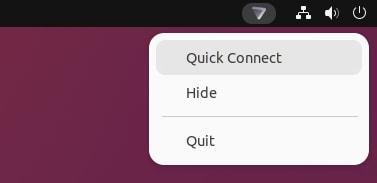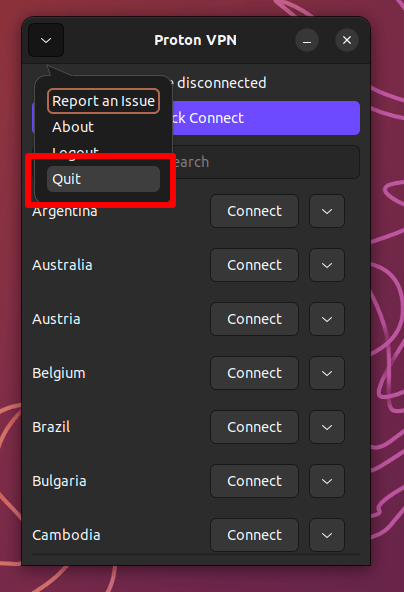denis@pop-os:~$ sudo -E hw-probe -all -upload
Probe for hardware ... Ok
Reading logs ... Ok
Uploaded to DB, Thank you!
Probe URL: https://linux-hardware.org/?probe=ccbfad6c6d
denis@pop-os:~$ sudo -E hw-probe -all -upload
Probe for hardware ... Ok
Reading logs ... Ok
Uploaded to DB, Thank you!
Probe URL: https://linux-hardware.org/?probe=ccbfad6c6d
If you're still encountering errors, let's try verifying the downloaded file:
Redownload: Ensure you're getting the correct file. Delete the current one and try redownloading the .deb file from our Downloads page.
Check File Size: Verify it's similar in size to what's listed on the download page.
Command Line Check: Use dpkg -I to inspect the file. Run: dpkg -I /path/to/linux_deb_x64.deb to see if it provides more insight into the issue.
Let me know if this helps or if there are any new issues!
wget https://windscribe.com/install/desktop/linux_deb_x64.deb
--2024-09-28 23:32:21-- https://windscribe.com/install/desktop/linux_deb_x64.deb
Resolving windscribe.com (windscribe.com)... 104.20.15.33, 104.20.14.33
Connecting to windscribe.com (windscribe.com)|104.20.15.33|:443... connected.
HTTP request sent, awaiting response... 302 Found
Location: //windscribe.com/download [following]
--2024-09-28 23:32:21-- https://windscribe.com/download
Reusing existing connection to windscribe.com:443.
HTTP request sent, awaiting response... 301 Moved Permanently
Location: https://windscribe.com/download/ [following]
--2024-09-28 23:32:21-- https://windscribe.com/download/
Reusing existing connection to windscribe.com:443.
HTTP request sent, awaiting response... 200 OK
Length: unspecified [text/html]
Saving to: ‘linux_deb_x64.deb’
linux_deb_x64.deb [ <=> ] 108.05K 225KB/s in 0.5s
2024-09-28 23:32:22 (225 KB/s) - ‘linux_deb_x64.deb’ saved [110646]
sudo apt-get install mc
1. Download the repository configuration and keys required to install the Proton VPN app. Enter:
wget https://repo.protonvpn.com/debian/dists/stable/main/binary-all/protonvpn-stable-release_1.0.4_all.deb
2. Install the Proton VPN repository containing the new app. Enter:
sudo dpkg -i ./protonvpn-stable-release_1.0.4_all.deb && sudo apt update
Please don’t try to check the GPG signature of this release package (dpkg-sig –verify). Our internal release process is split into several part and the release package is signed with a GPG key, and the repo is signed with another GPG key. So the keys don’t match.
If you want to check the repo package integrity, you can check its checksum with the following command:
echo "62a9d849835de8a5664cf95329458bf1966780b15cec420bf707b5f7278b9027 protonvpn-stable-release_1.0.4_all.deb" | sha256sum --check -
3. If you’re running the old (v3) Proton VPN app or CLI (stable or beta versions), simply run:
sudo apt update && sudo apt upgrade
If you don’t have Proton VPN installed, run:
sudo apt install proton-vpn-gnome-desktop
To check for updates and ensure that you’re running the latest version of the app, enter:
sudo apt update && sudo apt upgrade

By default, the GNOME desktop doesn’t support tray icons. To enable this functionality on Debian-based distributions:
1. Run:
sudo apt install libayatana-appindicator3-1 gir1.2-ayatanaappindicator3-0.1 gnome-shell-extension-appindicator
2. Restart the Proton VPN app (if it was already running). To do this, click V → Quit and open the app again.

You can now connect to the internet privately and securely using Proton VPN.
A warning about using pip and PyPI(new window)
To uninstall the Linux app, open a terminal and enter:
sudo apt autoremove proton-vpn-gnome-desktop && sudo apt purge protonvpn-stable-release
To uninstall our old (v3) Linux app, open a terminal and enter:
sudo apt-get autoremove protonvpn
Remove any leftover files:
rm -rf ~/.cache/protonvpn
And
rm -rf ~/.config/protonvpn
You can easily turn off the kill switch inside our Linux app, but this isn’t possible if you’ve already uninstalled it. In this case, you can remove the kill switch and restore access to the internet as follows:
a) Identify the Proton VPN connection name with the command:
nmcli connection show --active
This will show a list of your system’s active connections.
b) Look for any connections that begin with prefix pvpn- This usually includes pvpn-killswitch and pvpn-ipv6leak-protection, and may include pvpn-routed-killswitch. Delete all these connections using the following command:
nmcli connection delete [connection name]
For example:
nmcli connection delete pvpn-killswitch
c) Re-run the following command to check that all Proton VPN connections have been removed:
nmcli connection show --active
If you see any Proton VPN connections left, delete them as described above.
The beta version of our Linux app gives you access to new features before they are released publicly, but it is still in development. By using the beta version and sharing your feedback, you can help us find and address bugs.
Important: You cannot upgrade from the beta version of our Linux app to the stable version. You will need to uninstall the beta app and then install the official app. Similarly, if you are using the stable version of our Linux VPN app, you should uninstall it before installing the early beta version.
If you would like to install the beta version instead of the stable release of this app, open a terminal window and:
1. Download the beta package. Enter:
wget https://repo.protonvpn.com/debian/dists/unstable/main/binary-all/protonvpn-beta-release_1.0.4_all.deb
2. Install the Proton VPN beta repository containing the new app. Run:
sudo dpkg -i ./protonvpn-beta-release_1.0.4_all.deb && sudo apt update
Please don’t try to check the GPG signature of this release package (dpkg-sig –verify). Our internal release process is split into several part and the release package is signed with a GPG key, and the repo is signed with another GPG key. So the keys don’t match.
If you want to check the repo package integrity, you can check its checksum with the following command:
echo "53f877f3a0f63033feb9db8abc9959b468aefd6b196fc2dfbc11152f15362c8f protonvpn-beta-release_1.0.4_all.deb" | sha256sum --check -
3. If you’re running the old (v3) Proton VPN app or CLI (stable or beta versions), simply run:
sudo apt update && sudo apt upgrade
If you don’t have Proton VPN installed, run:
sudo apt install proton-vpn-gnome-desktop
To check for updates and ensure that you’re running the latest version of the app, enter:
sudo apt update && sudo apt upgrade
To uninstall the new Linux app, open a terminal and enter:
sudo apt purge "protonvpn*" proton-vpn-gnome-desktop && sudo apt autoremove
wget https://repo.protonvpn.com/debian/dists/stable/main/binary-all/protonvpn-stable-release_1.0.8_all.deb sudo dpkg -i ./protonvpn-stable-...